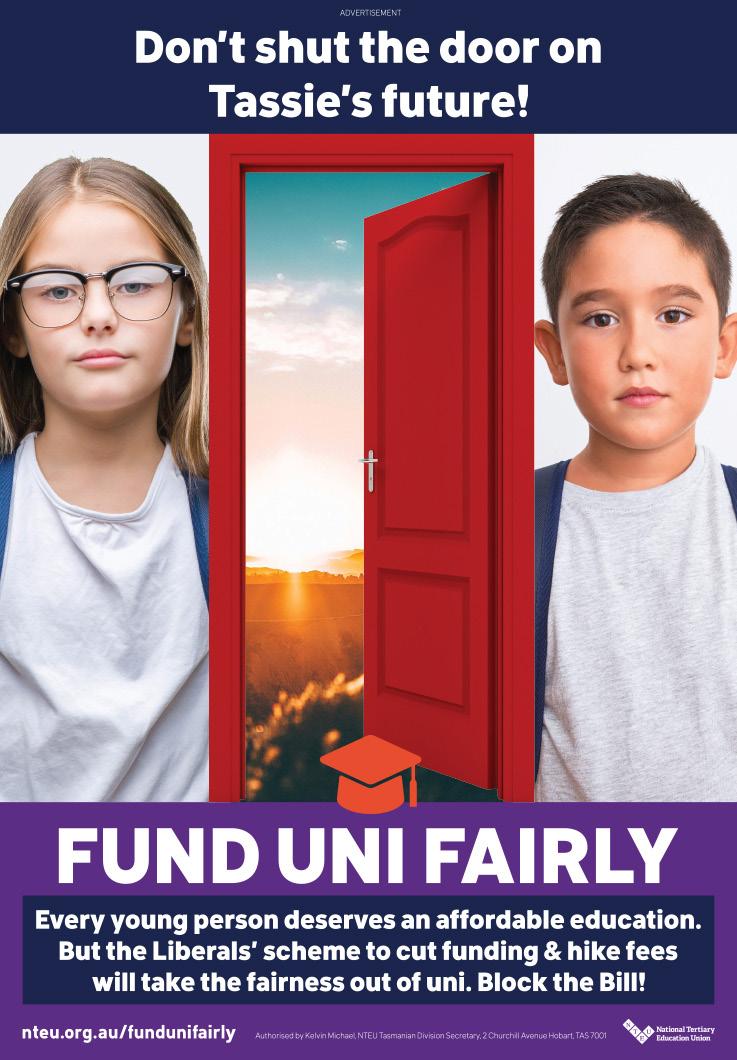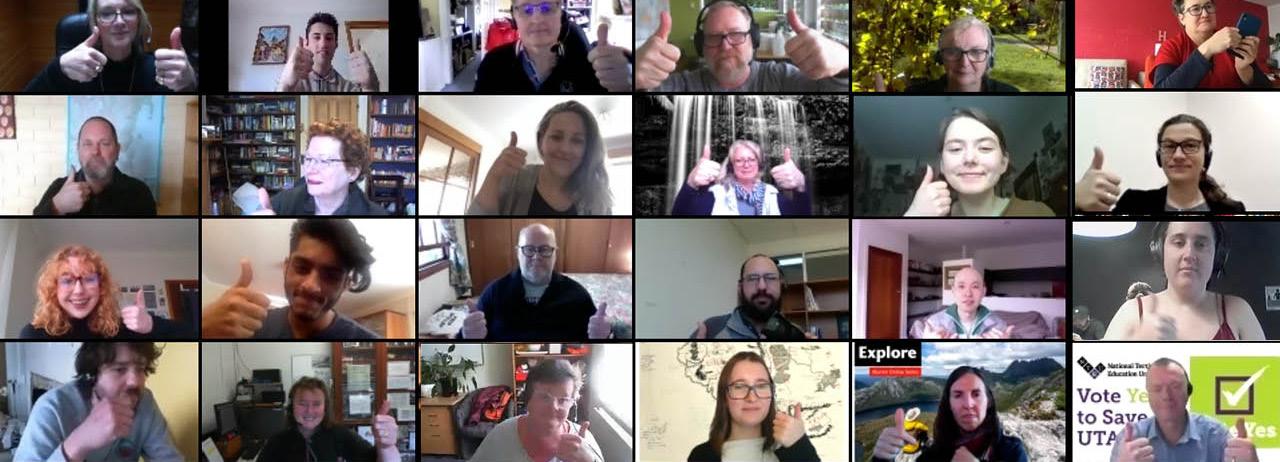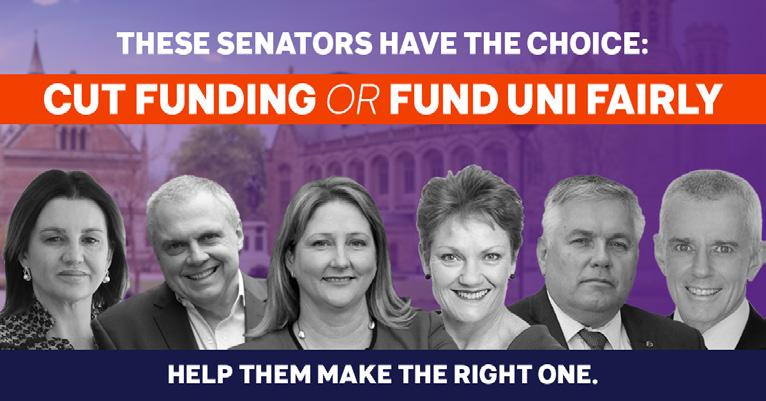
9 minute read
Policy & Research
from NTEU Annual Report 2019-2020
by NTEU

www.nteu.org.au/policy
Advertisement
Director (Policy & Research): Paul Kniest Policy & Research Officers: Dr Terri MacDonald, Kieran McCarron The unit is under the direction of the National President
Image (this page): Social media graphic for the #BlocktheBill campaign; Greens leader Adam Bandt with the NTEU’s Fund Uni Fairly polly pledge. Images (opposite page):State of the Uni survey 2020; Shadow Education spokesperson, Tanya Plibersek, supporting our Find Uni Fairly campaign in Federal Parliament; #BlocktheBill Fund Uni Fairly social media graphic, Sept 2020. 22 The most important issues addressed by the National Policy and Research Unit (PRU) during the last 12 months have been the profound impact of COVID-19 on universities and university staff and the need for a sustainable and fair funding framework for the sector.
COVID-19 While institutions responded early on in the pandemic by moving courses online and amending their education offerings and delivery, it soon become evident that COVID-19 would have more substantial and negative effects on the sector. The significant reduction in university revenue, primarily as a result of the collapse of the international student market, is estimated to have cost our universities somewhere between $3 billion and $5 billion in revenue this year and up to $19 billion over the next few years. This, in turn, has led to the broadest and deepest loss of jobs the sector has ever seen. While these job losses were initially felt by our casual, limited term and professional/ general staff, a wave of voluntary and forced redundancies has since flowed through to ongoing positions. As a result, over 12,600 jobs are now gone, with many more thousands likely to follow; the NTEU’s own projections are for around 30,000 job losses as a result of this current crisis. However, we know this does not include all of the thousands of casuals and fixed term workers who lost work or did not have their contracts renewed, with many universities hiding their true numbers of casual workers and the Government keen to play down media coverage. While all sectors of the economy have been impacted by the COVID-19 crisis, the Government has been selective as to which sectors are to be saved. While they were prepared to invest hundreds of billions in saving private sector jobs, our public universities were effectively excluded from accessing the same assistance. Instead, using the distraction of the COVID-19 crisis, the Morrison Government introduced its JobsReady Graduate suite of policies which have slashed public investment per student and, on average, increased student fees.
Policy Reviews and Budget Surpluses In policy terms, 2019 ended in a whimper. The Government released a number of policy reviews including the Coaldrake Review of provider classifications, the Napthine Review of regional tertiary education and the Noonan Review the Australian qualifications framework.
In November 2019 the Government released a set of practical guidelines (developed in conjunction with universities) to counter foreign interference in the Australian university sector.
Secrecy and the corporate university The COVID-19 crisis has not only exposed the Government’s hostility toward our universities but it has also highlighted the arrogance of university managements and their dismissive attitude to both staff
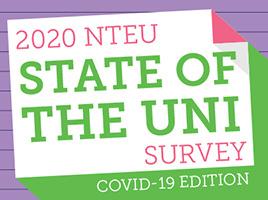
and students. The transformation of our universities from being important civic institutions operating for and in the public interests of their students, staff and the communities they serve, to corporate entities operating in their own self-interest is all but complete. Senior management could have chosen to share information about their financial position and staff losses with their staff by participating in the NTEU’s proposed Jobs Protection Framework (JPF) discovery process. But, with a few exceptions, instead of being paragons of transparency and public accountability, the senior management of our public universities have opted for managerial prerogative and secrecy.
Government support for higher ed While the Government injected over $150 billion dollars into supporting businesses and their employees in the wake of COVID-19, its support package for public universities amounted to a little over $40m over a fiveyear period, or the equivalent of $212,000 per university per year. To make things worse, the eligibility rules for JobKeeper were amended three times in order to explicitly exclude Australia’s public universities.
Job-Ready Graduates policies On the back of embarrassingly inadequate COVID-19 support package, the Government was able to get its Job-Ready Graduates (JRG) bill through Parliament. The passage of the Bill required the Government to deal with South Australia’s Centre Alliance (CA) and Pauline Hanson’s One Nation parties. Lower House MP Rebekha Sharkie and Senator Stirling Griff, both from CA, said they supported the JRG because it would give universities funding certainty. They also claimed as a win the leveraging of additional government supported places for SA’s three universities and the classification of these universities as ‘regional’, thus delivering an increase in funding load. However, their arrangement delivered for the entire sector the certainty of a drop in public investment by an average of 15% per student and an increase in student fees by an average of 8%, resulting overall in a 6% reduction of funding per student. While CA claimed the JRG polices would be good for regional universities and regional and disadvantaged students, sector analysis clearly showed that Aboriginal and Torres Strait Islander, women, low SES and regional students would be disproportionately affected by fee increases. The Government also accepted One Nation amendments to give students who pay their fees up-front a 10% discount and to limit access to Commonwealth supported places (CSP) to seven years. The amendments also require a review in 18 months. Although One Nation claimed that their ‘deal’ with the Government also went to defining academic freedom and free speech legislatively (noting that these are distinctively separate issues), at this stage no changes have been made to academic freedom provisions in the Higher Education Support Act 2003.
Federal Budget The October COVID-19 Budget delivered 12,000 additional CSPs and 50,000 additional discounted fee short courses (microcredentials) to the higher education sector for 2021. The additional CSPs will be national priority disciplines and details as to how they will be allocated are yet to be released. The bulk (up to 80%) of the short courses are expected to be delivered by non-university providers. The Government has made available public funding for non-university providers to run the short programs in priority areas. The $1 billion additional research support announced in the Budget is very much a short, sharp sugar hit. It is here for 2021 but will evaporate in 2022. While it might help some research jobs in 2021, it does nothing to address the underlying issues of underfunding of research and insecure contingent employment amongst research academics.

confirming our sector’s structural reliance on international students to maintain research.
Foreign interference, foreign relations, academic freedom and institutional autonomy As if denying our universities any real support to get through COVID-19 and slashing public funding per university student by 15% were not enough, the Government further demonstrated its hostility toward our public universities, proposing to interfere in their day to day operations in several very important ways, including: • The introduction of foreign interference guidelines. • Introducing new foreign relations legislation which would require all government and public university arrangements with foreign entities to be consistent with government foreign policy, even if that policy is not public or changes. • Trying to amend the provider classifications standards and use the
ERA to quantify the quality of university research. • Making it illegal for universities to enrol someone as a Commonwealth supported student if they have failed half of the subjects attempted under their degree. In 2019, the Government concocted a ‘crisis of free speech’ and enacted a review (known as the French Review) of university policies continued overpage...

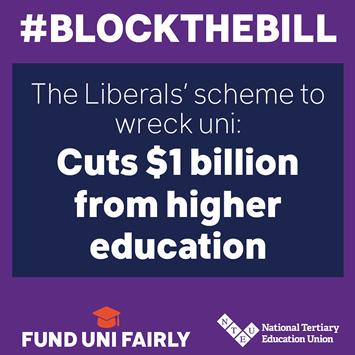
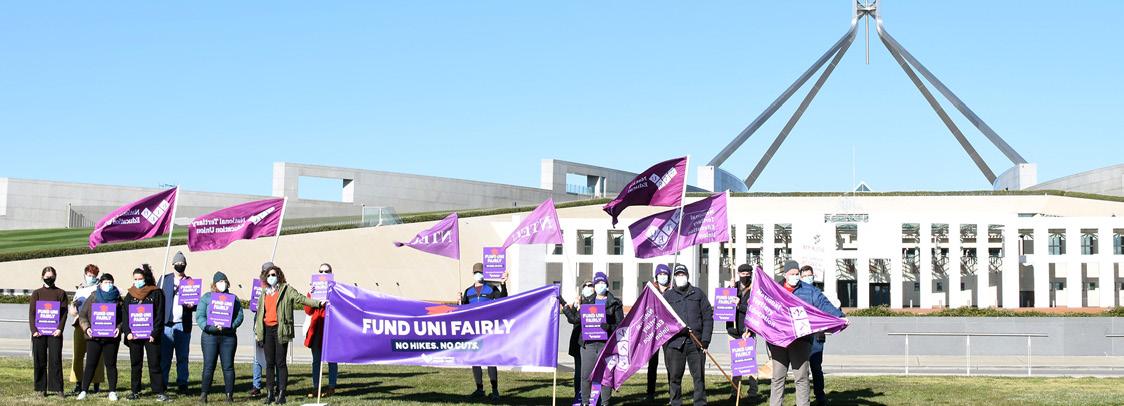
around both academic freedom and free speech on campuses. While former High Court Chief Justice Robert French found there to be no evidence of a ‘crisis’, the Government continued to push its ‘free speech’ agenda, which appeared primarily to reflect the Government’s long running view that there is ‘left-leaning bias’ on university campuses shutting down academic debate and skewing curricular. The Government insisted on universities adopting new guidelines on academic freedom and freedom of speech, and has now organised a review to determine which universities are yet to adopt the supposedly ‘voluntary’ guidelines as institutional policy. While the Union has long held the view that academic freedom can be legislatively strengthened, the reality is that the only way to ensure the protection of academic freedom is through our industrial agreements. We are also concerned about the possible dilution of academic freedom by conflating it with the principles of free speech.
State of the University Survey The PRU has produced a new analysis of 2019 State of the Uni survey data, building on the time series created by previous surveys. In addition, a special 2020 COVID-19 edition of NTEU State of the Uni survey was produced to specifically aide the Union’s efforts to gauge the impact of COVID-19 on university staff. This survey was sent to around 200,000 sector staff and asked specific questions about the impact of COVID-19 on working lives, staff mental health, and attitudes towards key sector participants and government policy changes.
Lobbying, campaign & industrial work The PRU has been active in the Union’s lobbying, campaign, and industrial efforts, particularly in relation to the COVID-19 crisis, university job losses, the Government’s JRG changes and academic freedom. The Unit has made numerous parliamentary submissions, including to the COVID-19 inquiry and around the JRG package, and appeared before Senate Committees on multiple occasions to argue on behalf of our members and higher education staff and students more broadly. The PRU also engaged directly with NTEU members, activists, delegates and organisers, providing online seminars and briefings, creating dozens of briefing papers, memos and campaign flyers, and contributing to the Union’s broader print and social media publications. We assisted in briefing the media, supported the Union’s campaign ‘snap actions’ and encouraged our members to participate in the NTEU’s lobbying efforts, including the more than 400 member submissions to the senate review the JRG legislation (which we had lobbied for). We engaged directly with the opposition parties and independent crossbenchers to leverage support for the NTEU’s position and worked closely with other unions, including the AEU, ASU and ACTU, as well as professional bodies in support of the JRG campaign. While the work of the PRU has been integral in supporting the Union’s activism, lobbying and campaign work, we have also been focused on the Union’s continued efforts to build strength and membership. Importantly, we continue to advocate for an equitable and fairly funded sector, where access to a university education is based on merit and not capacity to pay. ◆
